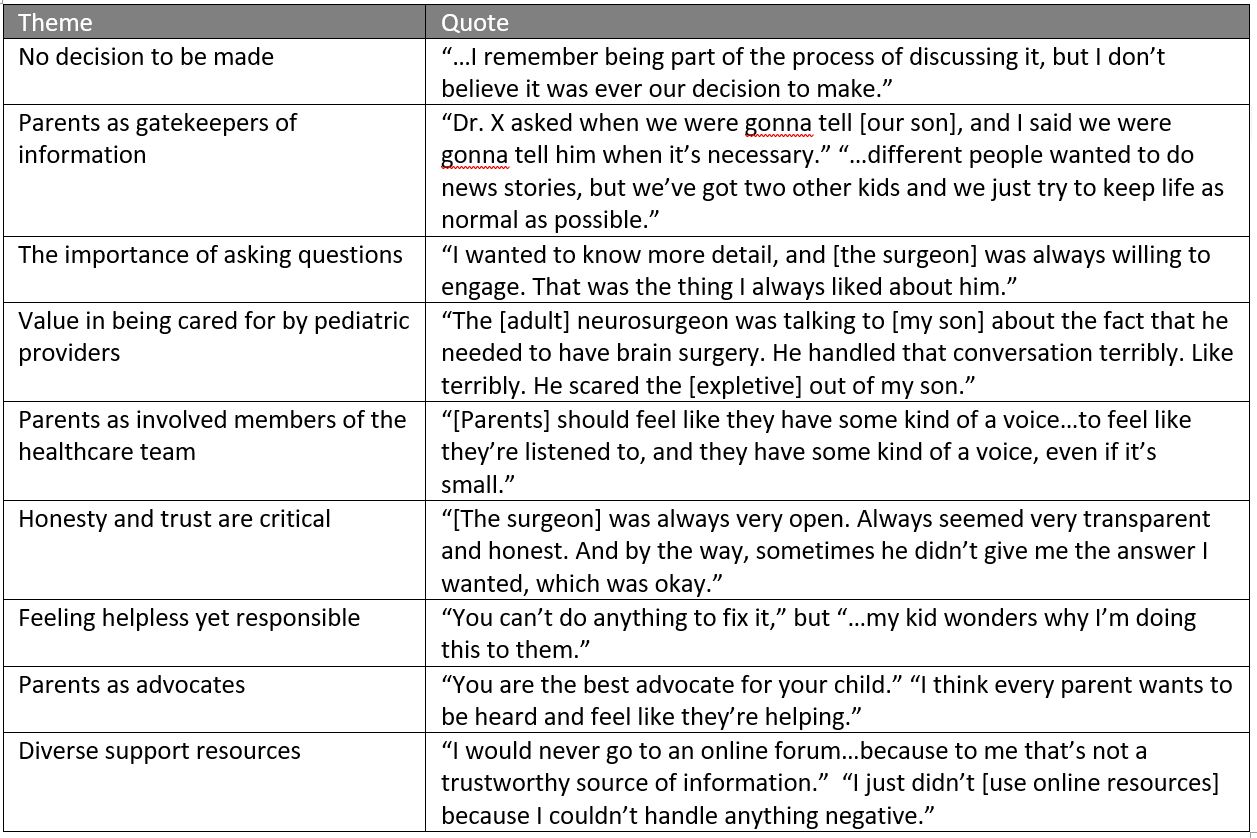Hematology/Oncology
Category: Abstract Submission
Hematology/Oncology II
577 - Parental Preferences for Surgical Counseling in Pediatric Oncology
Sunday, April 24, 2022
3:30 PM - 6:00 PM US MT
Poster Number: 577
Publication Number: 577.321
Publication Number: 577.321
Erica M. Carlisle, University of Iowa, Iowa City, IA, United States; Maxwell Lieberman, University of Iowa, Iowa City, IA, United States; Laura Shinkunas, University of Iowa Roy J. and Lucille A. Carver College of Medicine, Iowa City, IA, United States; Richard Hoffman, University of Iowa Roy J. and Lucille A. Carver College of Medicine, Iowa City, IA, United States; Heather S. Reisinger, University of Iowa Roy J. and Lucille A. Carver College of Medicine, Iowa City, IA, United States

Laura Shinkunas, MS
Research Specialist
University of Iowa Roy J. and Lucille A. Carver College of Medicine
Iowa City, Iowa, United States
Presenting Author(s)
Background: Ninety percent of parents of pediatric oncology patients report significant psychologic distress and emotionally burdensome healthcare interactions. Assuring supportive, yet informative discussions may limit the distress parents experience during clinical encounters. This may be challenging when discussing the complex, high-risk operations needed to treat pediatric cancer.
Objective: Here, we interview parents of pediatric surgical oncology patients to enhance our understanding of parental preferences for surgical counseling in pediatric oncology.
Design/Methods: Ten parents of 10 children who had undergone solid tumor resection at a University-based, tertiary children’s hospital over 5 years participated in 60-minute semi-structured interviews with a medical anthropologist. Interviews were recorded and transcribed. Thematic content analysis was performed via grounded theory approach. An iterative approach to thematic sampling and data analysis was used.
Results: Thematic saturation was achieved after 10 interviews. Nine key themes emerged: (1) No decision to be made; (2) Parents as gatekeepers of information; (3) The importance of asking questions; (4) Value in being cared for by pediatric providers; (5) Parents as involved members of the healthcare team; (6) Honesty and trust are critical; (7) Feeling helpless yet responsible; (8) Parents as advocates; (9) Diverse support resources. Parents recognize that few treatment decisions exist, but they prioritize asking questions to advocate for their children. Parents expressed dissatisfaction with non-pediatric providers and emphasized the importance of deciding when and how their child’s diagnosis was disclosed to the child, family members, and the community. Parents relied on diverse resources to manage the expressed conflict between feeling helpless yet responsible for their children’s suffering.Conclusion(s): When discussing cancer surgery for their children, parents value open discussion with surgeons, and view this as promoting informed involvement in their child’s care. Findings will guide development of a decision support tool that will empower parents to more effectively engage in surgical discussions.
Identified themes with representative quotes.
Objective: Here, we interview parents of pediatric surgical oncology patients to enhance our understanding of parental preferences for surgical counseling in pediatric oncology.
Design/Methods: Ten parents of 10 children who had undergone solid tumor resection at a University-based, tertiary children’s hospital over 5 years participated in 60-minute semi-structured interviews with a medical anthropologist. Interviews were recorded and transcribed. Thematic content analysis was performed via grounded theory approach. An iterative approach to thematic sampling and data analysis was used.
Results: Thematic saturation was achieved after 10 interviews. Nine key themes emerged: (1) No decision to be made; (2) Parents as gatekeepers of information; (3) The importance of asking questions; (4) Value in being cared for by pediatric providers; (5) Parents as involved members of the healthcare team; (6) Honesty and trust are critical; (7) Feeling helpless yet responsible; (8) Parents as advocates; (9) Diverse support resources. Parents recognize that few treatment decisions exist, but they prioritize asking questions to advocate for their children. Parents expressed dissatisfaction with non-pediatric providers and emphasized the importance of deciding when and how their child’s diagnosis was disclosed to the child, family members, and the community. Parents relied on diverse resources to manage the expressed conflict between feeling helpless yet responsible for their children’s suffering.Conclusion(s): When discussing cancer surgery for their children, parents value open discussion with surgeons, and view this as promoting informed involvement in their child’s care. Findings will guide development of a decision support tool that will empower parents to more effectively engage in surgical discussions.
Identified themes with representative quotes.

